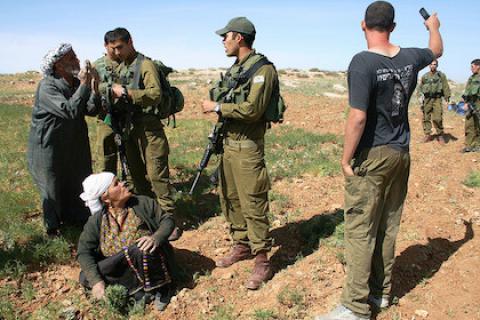Israel on Sunday confiscated nearly 1,000 acres of privately owned Palestinian land near an Israeli settlement south of Bethlehem in the West Bank — a move described by Israeli rights group Peace Now as “unprecedented in its scope since the 1980s."
Settlements built on Palestinian land occupied by Israel, including East Jerusalem, are deemed illegal by the United Nations. Israel’s refusal to halt their construction and expansion has at times arrested the peace process and increased resentment and distrust among Palestinians.
In a statement published on its website, Peace Now condemned the latest land confiscation and said it further damaged the chance of achieving a lasting peace between Israelis and Palestinians based on a two-state solution.
The group also said the move ran contrary to the “new diplomatic horizon” that Israeli Prime Minister Benjamin Netanyahu spoke of earlier this month, even as Israel and Hamas exchanged blows in a deadly battle that devastated the Gaza Strip.
“Peace Now views this declaration as proof that Prime Minister Netanyahu does not aspire for a new ‘Diplomatic Horizon’ but rather, he continues to put obstacles to the two state vision and promote a one state solution,” the group said.
Later on Sunday, a U.S. State Department official characterized the land confiscation as "counterproductive” and urged Israel to “reverse” its decision.
British Foreign Secretary Philip Hammond echoed that call on Monday, saying the move had the potential to reignite violence between the two parties.
"This is a particularly ill-judged decision that comes at a time when the priority must be to build on the cease-fire in Gaza. It will do serious damage to Israel's standing in the international community," Hammond said.
Sunday's confiscation of Palestinian territory is the latest and largest in a series of land grabs near the Israeli settlement of Gvaot, said Peace Now. Some 243 acres in the area were declared state land last April.
Palestinian landowners in the villages of Surif, Husan, Al-Jabaa, and the city of Bethlehem were given 45 days to submit formal objections to the announced confiscation in Israeli courts, Palestinian news website Maan reported. If the landowners do not contest the order, the additional territories seized will also be declared Israeli state-owned land.
In the past, Palestinians have complained that their objections were largely ignored or denied by Israeli authorities that seek to create facts on the ground to bolster claims on Palestinian territories in a future peace settlement.
"The intention of appropriating the land is to create territorial continuity between the Green Line and settlements of Beitar Illit, Kfar Etzion, and Gvaot," Haaretz reported. "The announcement is the latest in a series of plans designed to attach the Etzion settlement bloc to Jerusalem and its environs."
The Green Line refers to the internationally recognized border between Israel and the West Bank, territory Israel captured and occupied in 1967. Critics of Israeli land confiscations say they reveal that the current Israeli government is not interested in returning territory to Palestinians in order to realize a two-state solution as the parties envisioned it in 1993.
In July, Netanyahu said in a press conference that he would never accept Palestinian sovereignty in the West Bank for security reasons.
“I think the Israeli people understand now what I always say: There cannot be a situation, under any agreement, in which we relinquish security control of the territory west of the river Jordan,” he said.
Nabil Abu Rudeineh, spokesman for Abbas, said Sunday that the latest land grab would “lead to more instability” and “inflame the situation after the war in Gaza,” Haaretz reported.
Peace Now echoed the sentiment, saying, "By declaring another 4,000 dunams (990 acres) as state land, the Israeli government stabs President Abbas and the moderate Palestinian forces in the back, proving again that violence delivers Israeli concessions while nonviolence results in settlement expansion."
Israel has announced nearly 1,500 new settlement homes since mid-June, Maan reported, which could house more than 6,000 new settlers in the West Bank. Israeli settlement activity increased dramatically in April during the last round of failed peace negotiations.
[Renee Lewis is a Digital News Producer for Al Jazeera America.]


Spread the word